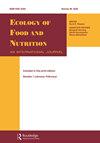2019冠状病毒病对粮食安全和健康的影响。
IF 1.3
4区 医学
Q4 NUTRITION & DIETETICS
引用次数: 0
摘要
本文章由计算机程序翻译,如有差异,请以英文原文为准。
Impact of COVID-19 on Food Security and Health.
Ecology of Food and Nutrition (EFN) promotes scholarly discussion and engagement on the holistic and cross-cultural dimensions of food and nutrition. Articles published in this journal focus on foods and food systems in terms of their utilization to satisfy human nutritional needs and improve health and well-being. The journal also publishes articles that examine how ecological, social, and cultural factors influence food availability, choices, and consumption, food cultures, and nutrition. Only a handful of journals publish articles that explicitly address the intersections of food and nutrition, biology and culture, and policy and practice from a holistic and global perspective. It is this kind of scholarship that EFN seeks to promote. The current issue of EFN includes six articles based on studies conducted in Canada, Mexico, Turkey, and the United States. These articles focus on a range of topics, including the relationship between stress and food consumption, impact of the COVID-19 pandemic on food availability and stress, the Supplemental Nutrition Assistance Program (SNAP), and edible plant diversity. The article by Alexiuk and colleagues focuses on food and nutritional insecurity among newcomer youth in Manitoba, Canada. The authors collected cross-sectional data using an online survey on food intake, eating behaviors, and self-reported health status among 1,347 youth. This is one of the few studies in Canada to directly ask youth about their experiences of food insecurity. It concludes that food security by itself is not enough for optimal health. Nutritional security plays a critical role in optimal health. Based on these findings, the authors advocate for practical-based educational programs in schools focusing on healthy cooking and eating. The COVID-19 pandemic caused food insecurity and hunger among millions of people around the world. To prevent the spread of the disease, several strategies – physical distancing, school closures, lockdowns, etc. – were mandated. These mandates excacerbated food and nutritional challenges that households with food insecurity were already facing. The article by Bradley describes the impact of the COVID-19 pandemic on food access in Buffalo, New York – a region in the United States with significant food insecurity. The author used data collected through surveys and qualitative interviews with users of food pantries to understand their experiences with food insecurity during the peak time of the COVID-19 pandemic. The authors argue that effective emergency food responses should also focus on other barriers, including transportation, stigma, and chronic poverty in households facing chronic food insecurity. ECOLOGY OF FOOD AND NUTRITION 2023, VOL. 62, NOS. 1–2, 1–2 https://doi.org/10.1080/03670244.2023.2194098
求助全文
通过发布文献求助,成功后即可免费获取论文全文。
去求助
来源期刊
CiteScore
3.50
自引率
0.00%
发文量
23
审稿时长
>12 weeks
期刊介绍:
Ecology of Food and Nutrition is an international journal of food and nutrition in the broadest sense. The journal publishes peer-reviewed articles on all aspects of food and nutrition -- ecological, biological, and cultural. Ecology of Food and Nutrition strives to become a forum for disseminating scholarly information on the holistic and cross-cultural dimensions of the study of food and nutrition. It emphasizes foods and food systems not only in terms of their utilization to satisfy human nutritional needs and health, but also to promote and contest social and cultural identity. The content scope is thus wide -- articles may focus on the relationship between food and nutrition, food taboos and preferences, ecology and political economy of food, the evolution of human nutrition, changes in food habits, food technology and marketing, food and identity, and food sustainability. Additionally, articles focusing on the application of theories and methods to address contemporary food and nutrition problems are encouraged. Questions of the relationship between food/nutrition and culture are as germane to the journal as analyses of the interactions among nutrition and environment, infection and human health.

 求助内容:
求助内容: 应助结果提醒方式:
应助结果提醒方式:


